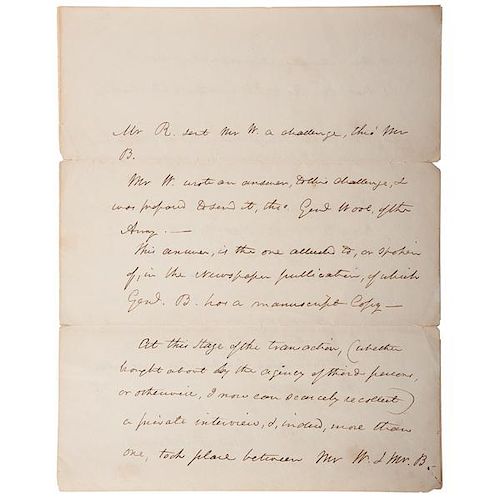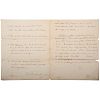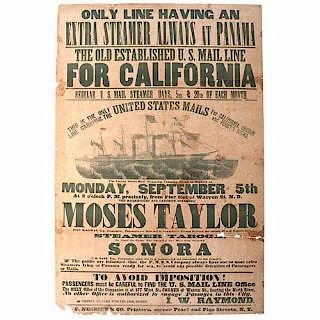Extremely Rare Anonymous Letter Concerning Senator John Randolph Challenging Senator Daniel Webster to a Duel
About Seller
6270 Este Ave.
Cincinnati , OH 45232
United States
With offices in Cincinnati, Cleveland and Denver, Cowan’s holds over 40 auctions each year, with annual sales exceeding $16M. We reach buyers around the globe, and take pride in our reputation for integrity, customer service and great results. A full-service house, Cowan’s Auctions specializes in Am...Read more
Two ways to bid:
- Leave a max absentee bid and the platform will bid on your behalf up to your maximum bid during the live auction.
- Bid live during the auction and your bids will be submitted real-time to the auctioneer.
Bid Increments
| Price | Bid Increment |
|---|---|
| $0 | $25 |
| $500 | $50 |
| $1,000 | $100 |
| $2,000 | $250 |
| $5,000 | $500 |
| $10,000 | $1,000 |
| $20,000 | $2,500 |
| $50,000 | $5,000 |
| $100,000 | $10,000 |
About Auction
Jun 10, 2016 - Jun 11, 2016
Cowan's Auctions dawnie@cowans.com
- Lot Description
Extremely Rare Anonymous Letter Concerning Senator John Randolph Challenging Senator Daniel Webster to a Duel
Unsigned letter, 2pp, written by a friend of Massachusetts Senator Daniel Webster, resolving Virginia native-John Randolph's challenge to a duel. No date, likely ca 1825-1826.
Eccentric politician John Randolph (1773-1883) of Roanoke was a strident speaker, infamous for his hot temper. Many times his passionate orations stirred equally fervent opposition within the Senate and Congress. His rage often flared and, like many gentlemen and politicians of his time, resulted in challenges to duels.
John Randolph challenged the venerated Congressmen Daniel Webster to a duel twice. Once in 1816, when Randolph felt scorned by the words Webster spoke in a debate over sugar duty in the House. The second in 1825, occurred after Randolph seethed for eight months over Webster denying Congressmen Crawford “the fullest opportunity to answer the charges against him.” (Register of Debates, 18th Congress, 2nd Session, 56-58) Unable to contain his fury any longer, Randolph exploded and challenged Webster again. In the second challenge, Senator Thomas Hart Benton delivered the dare by Randolph to Webster while the House was in session. Mutual friends intervened on both challenges and attempted to resolve the matters as quietly as possible. Historians believe that Benton played an important role in resolving the second conflict between the feuding congressmen. Randolph withdrew both challenges; however, in 1826, as a result of seriously insulting Secretary of State Henry Clay on the Senate Floor, Randolph accepted Clay's challenge to a duel, which subsequently took place but concluded with a handshake.
Research indicates that the letter offered here, authored by a friend or politician from Massachusetts, pertains to Randolph's second challenge to Webster. The letter reads:
Mr. R sent Mr. W. a challenge, thro’ Mr. B.
Mr. W. wrote an answer, to this challenge, and was prepared to send it, thro. Genl Wool, of the Army.
This answer, is the one alluded to, or spoken of, in the newspaper publication, of which Genl. B. has a manuscript copy.
At this stage of the transaction, whether brought about by the agency of third persons, or otherwise, I now can scarcely recollect a private interview, and, indeed, more than one, took place between Mr. W and Mr. B. at these interviews, it was finally arranged;
1.That Mr. R. should withdraw the challenge
2.That Mr. W. should destroy his answer, and keep no copy.
3.That, therefore, Mr. B. should be at liberty to say that Mr. R. that Mr. W. did not intend, in what he said, to impeach Mr. R’s personal veracity.
4.That neither party should make, or authorize any publication, respecting the transaction.
Genl. Brechenridge may be assured that the forgoing is an accurate short statement of the agreement. My copy of the writing is at Boston-
I destroyed my letter, according to agreement; I left no copy. From that day to this; I do not know that I have spoken of its contents to friends. As contents were known to Mr. Lloyd, then Senator of Massachusetts, Genl Wool, and one other Gentlemen. I principally conferred, in relation to the whole transaction, in all its stages, with Mr. Lloyd. I have scrupulously fulfilled my part of the agreement, be to not authoring every publication.
Beyond their titles as Senator and Congressmen, John Randolph became the Minister of Russia and served in the House of Representatives four times, while Senator Daniel Webster became a very adept US Secretary of State and was hailed as the greatest to ever hold the position. He formed part of the "Great Triumvirate," a political group who opposed Andrew Jackson.
For more information about the duel, refer to Daniel Webster: The Man and His Time by Robert Vincent Remini (1997).
The letter has some typical folds and separation of the binding. There is some brittleness and minor tears on the folds.Condition
- Shipping Info
-
SHIPPING. At the request of the buyer, Cowan's will authorize the shipment of purchased items. Shipments usually occur within two weeks after payment has been received. Shipment is generally made via UPS Ground service. Unless buyer gives special instructions, the shipping method shall be at the sole discretion of Cowan's Auctions, Inc.. Cowan's is in no way responsible for the acts or omissions of independent handlers, packers or shippers of purchased items or for any loss, damage or delay from the packing or shipping of any property.
-
- Buyer's Premium



 EUR
EUR CAD
CAD AUD
AUD GBP
GBP MXN
MXN HKD
HKD CNY
CNY MYR
MYR SEK
SEK SGD
SGD CHF
CHF THB
THB












